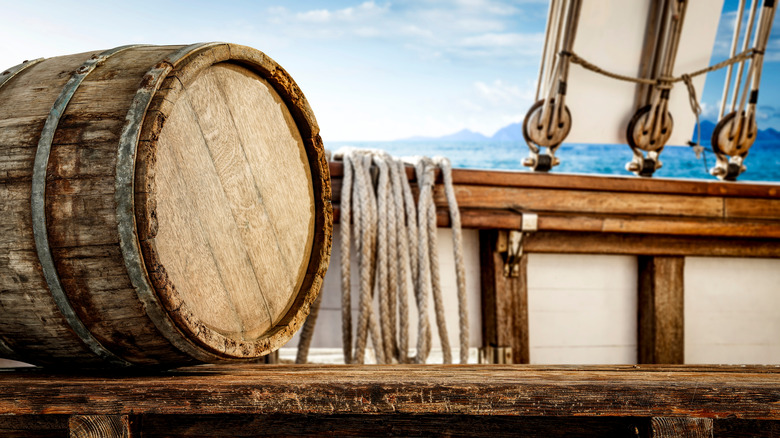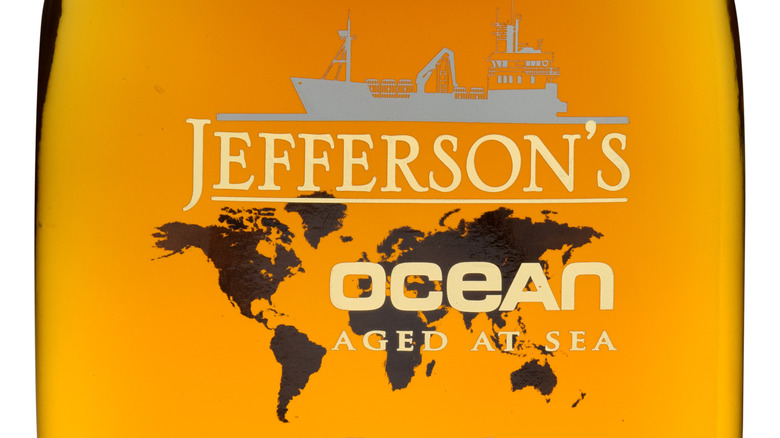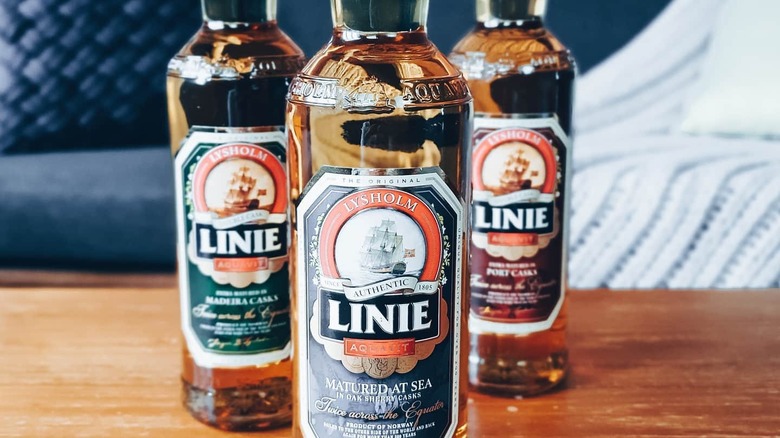Why Some Distillers Age Their Liquor At Sea
When we think of aged spirits like bourbon or whiskey, we often picture stacks of wooden barrels stored in a cellar or warehouse. During the barrel aging process, the type of wood (typically different varieties of oak) gives the liquor its color and unique flavors. But some distillers are no longer content to age their product on land and have turned to the sea to reap its potential aging benefits.
Part of the appeal of water-aged booze is the ocean air itself, which can impact what's described as the breathing of the barrel, causing the liquor to have more extensive contact with the oak or other wood and expediting the aging process. It also imparts a profile of brininess from the salt air. Those who use ships to age their booze are relying on the dual factors of temperature fluctuations that cause the expansion and contraction of the barrels, and the motion of the waves that further increases the contact of the liquor with the wood, hastening the aging process and enhancing the flavors. The barometric pressure and the humidity also come into play, with the humidity supposedly lessening the amount of alcohol that evaporates during the aging process.
Whatever floats your bourbon
Trey Zoeller, founder of Jefferson's Bourbon, experimented with aging bourbon barrels for several years on a shark research vessel called the Ocearch. The end result was Ocean, launched in 2012, which became one of his best-selling brands. Of course, aging liquor at or below the sea is not all positive. In France, Benjamin Kuentz, owner of Maison Benjamin Kuentz, ages 1,000 bottles of his amber gold whiskey Uisce de Profundis 65 feet underwater for 11 months each year. He loses nearly half those bottles annually to exploding corks, though the sacrifice is worth it to him for the distinctive character of dry, floral, fruity, and salty profiles the underwater aging process creates.
Rogue Ales & Spirits along Oregon's coast has an ocean-aging room situated next to the Pacific Ocean. On the East Coast, Massachusetts' Triple Eight Distillery and Newport Craft Brewing and Distilling Co. take advantage of their proximity to the Atlantic to age single malts and rum and whiskey. Some, such as O.H. Ingram, have gone the river route, creating a floating warehouse on the Mississippi River to develop their River-Aged Straight Bourbon.
So, is there really something to the trend of water-aged spirits or is it more of a marketing gimmick? Hank Ingram, CEO of Brown Water Spirits which owns O.H. Ingram, supports the former view. As he told liquor.com, "I think you're seeing (this technique) grow because it works. If it were purely a marketing schtick people would stop doing it."
Reviving an old school tradition
Of course, the process itself of aging liquor at sea is nothing new. Hundreds of years ago barrels of whiskey and other types of liquor were conveyed by ships to ports around the world via various trade routes as a matter of necessity. In 1806, a shipload of aquavit was shipped halfway around the world from Norway, and when the liquor didn't sell the ship made the voyage home again, still full of barrels of alcohol. The aquavit, which was originally clear and sharp-flavored, had taken on a more pleasing flavor and an amber color. As a result, to this day some brands of Norwegian aquavit are transported in barrels on ships that cross the equator twice.
Modern distillers utilizing the practice are essentially rediscovering the method and returning to a traditional way of barrel aging. Zoeller ages his Ocean line of bourbons along different trade routes because each route can create its own distinctive flavors. Carl O'Grady of Connacht Whiskey Company in County Mayo, Ireland, ages whiskey on a 36-foot wooden-hulled boat called the Dolphin that sits at the mouth of the bay. He has noted that the combined effects of motion and seawater lend it a unique sweetness and a rich maritime note. There are disparate ways distillers now age liquor at sea, harkening back to previous centuries, but the ultimate purpose is always the same: to enhance the flavor of the spirit more quickly through a faster aging process.


